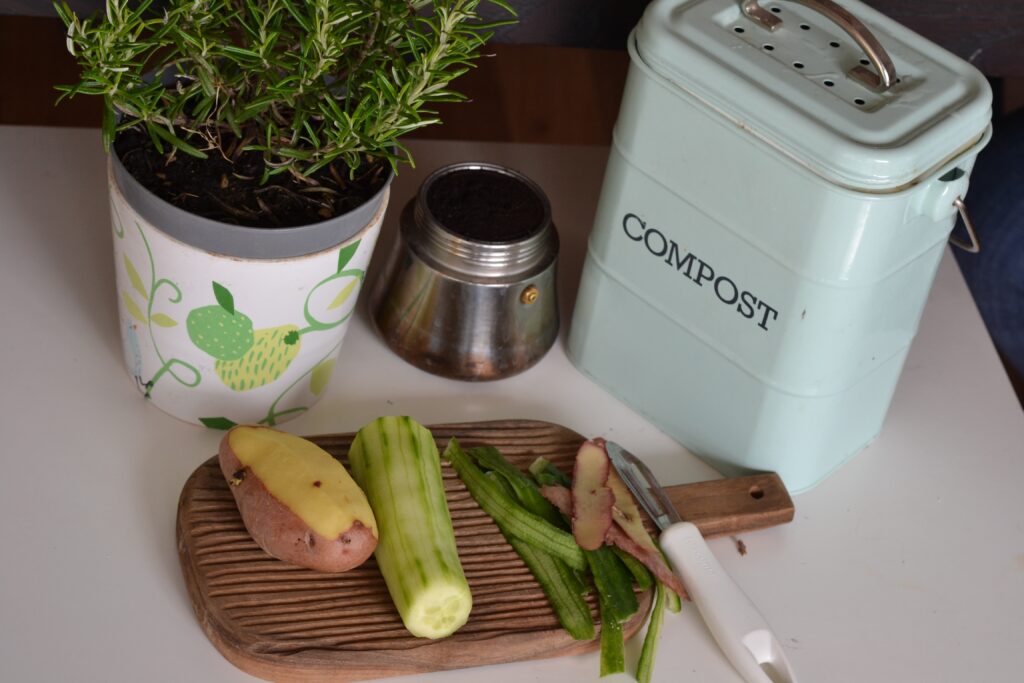In a world increasingly focused on sustainability and reducing waste, composting emerges as a simple yet impactful practice that can transform our leftover scraps into invaluable resources. Composting isn’t just for the seasoned gardeners; it’s a sustainable solution that anyone can embrace, turning kitchen waste into nutrient-rich soil that nurtures plants, reduces landfill waste, and contributes to a healthier planet. Join us as we delve into the basics of composting and uncover the magic of transforming waste into garden gold.
The Art of Composting:
At its core, composting is a natural process that mimics the decomposition of organic matter in nature. It involves creating the perfect environment for microorganisms – bacteria, fungi, and insects – to break down kitchen and yard waste into nutrient-rich compost.

What Can Be Composted:
Almost anything that was once alive can be composted, provided it’s organic and biodegradable. This includes:
- Kitchen Scraps: Fruit and vegetable peels, coffee grounds, tea bags, eggshells, and even small amounts of leftover food.
- Yard Waste: Leaves, grass clippings, small branches, and plant trimmings.
- Paper Products: Shredded newspaper, cardboard, and paper towels.
What Shouldn’t Be Composted:
Avoid composting materials that can attract pests, introduce diseases, or slow down the composting process:
- Meat and Dairy: These can attract unwanted animals and create odors.
- Oily or Greasy Foods: These can disrupt the compost’s balance.
- Diseased Plants: Plant material infected with diseases can spread to your compost and later to your garden.
- Pet Waste: Pet waste may contain harmful bacteria.
Getting Started with Composting:
- Choose a Bin: Select a composting bin that suits your available space and needs. Options range from small indoor bins to larger outdoor ones.
- Location Matters: Place your bin in a well-drained area that receives some sunlight. This aids the decomposition process.
- Layering: Start with a layer of browns (dry materials like leaves or shredded newspaper) followed by greens (kitchen scraps). Alternate layers to create a balance between carbon-rich and nitrogen-rich materials.
- Aerate: Regularly turn or mix the compost to introduce oxygen, which helps the microorganisms thrive.
- Maintain Moisture: Keep the compost moist but not soggy. If it’s too dry, microorganisms can’t work effectively.
- Patience is Key: Composting takes time. Depending on the method and conditions, you can have usable compost in a few months to a year.
Benefits of Composting:
- Reduces Landfill Waste: Organic waste makes up a significant portion of landfills. Composting diverts this waste from landfills, where it would emit harmful greenhouse gases.
- Enriches Soil: Finished compost is a nutrient-rich soil amendment that enhances soil structure, water retention, and nutrient availability for plants.
- Promotes Biodiversity: Compost encourages beneficial microorganisms and earthworms in the soil, fostering a healthier ecosystem.
- Saves Money: You’ll reduce the need for store-bought fertilizers and soil amendments.
- Empowers Sustainability: Composting is a small, tangible way to contribute to a more sustainable lifestyle.
Different Composting Methods:
- Backyard Composting: This involves using an outdoor compost bin or pile. It’s suitable for those with yard space and a bit of patience.
- Indoor Composting: If you lack outdoor space, you can compost indoors using a small bin or worm composter (vermicomposting).
- Community Composting: Many communities offer composting programs or centers where you can drop off your compostable waste.
Conclusion: Nurturing the Earth, One Scraps at a Time:
Composting is a testament to the transformative power of nature and human ingenuity. By turning kitchen and yard waste into nutrient-rich soil, we not only enrich our gardens but also reduce our environmental footprint. The simple act of composting can be a gateway to a more sustainable lifestyle, fostering a deeper connection to the Earth and inspiring positive change. So, whether you have a sprawling garden or a small balcony, consider embracing the art of composting and witness the magic of how waste can bloom into something beautiful.

















